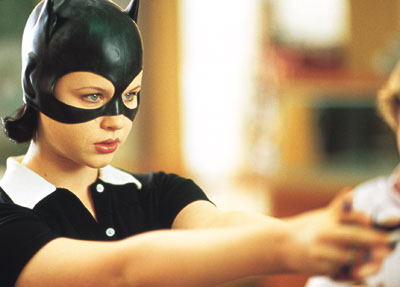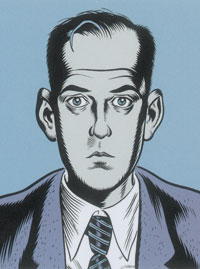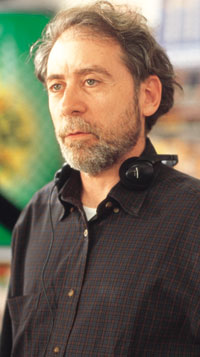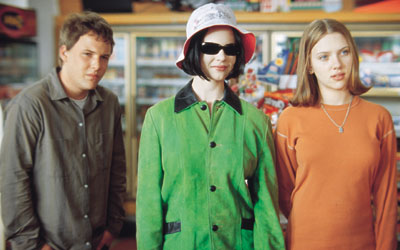SPIRITS MOVE ME
Having documented the life of graphic artist R. Crumb, Terry Zwigoff tackles his first fiction feature – a screen translation of Daniel Clowes’s cult comics classic, "Ghost World." Ray Pride chats with Zwigoff.
 |
| Thora Birch in Ghost World |
Dan Clowes is the graying kid of id, only slightly the senior of a latter-day generation of comics artists who ink psychological portraits as piercing as their penwork. The passionate, oft-cynical creations of his decade-old "Eightball" series have now prompted perhaps the least burlesque rendition of teen life in recent memory: Crumb director Terry Zwigoff’s filming of Ghost World.
"Ghost World" began as a serial in "Eightball" and was later collected as a freestanding graphic novel. On screen, Clowes’s story is transformed by Zwigoff into a teen movie Freddie Prinze, Jr., wouldn’t recognize, although the alienated teenager in all the rest of us should find much to share from its characters’ mercurial, fretful, brilliant and misguided moods. In Ghost World, which was co-scripted by Clowes and Zwigoff, Thora Birch and Scarlett Johansson try to find meaning after high school, understand themselves and how others see them, and work out fondnesses for both the geeky likes of Steve Buscemi as well as black rubber cat masks.
As with other practitioners of the deeply personal vocabulary of auteur comics – such as Chris Ware with his incomparable memory piece, "Jimmy Corrigan: The Smartest Kid on Earth," or Adrian Tomine’s deft, terse "Optic Nerve," filled with minor chord alienation – Clowes uses the comics form as a way of inscribing experience. His approach is never cartoonish, a pejorative more appropriately daubed atop arrogant tracts of confected banality like Pearl Harbor. But unlike most comics that have been turned into films, "Ghost World" is hardly a household name. Accordingly, it took several years to find financing. But it was finally made, and all concerned are proud of the result, which will be released shortly to an unsuspecting world through United Artists (whose films are seldom nourished by adequate advance publicity).
 |
| Daniel Clowes Self Portrait |
Almost as a joke, Clowes has mentioned the classic textbook The 5 C’s of Cinematography as a key to his narrative style. "The 5 C’s of Cinematography is such a great thing," he says with genuine enthusiasm. "It explains all the storytelling conventions you need to know when you’re 17 so you don’t spend the next 15 years, as I did, learning them via trial and error. But mostly I’m interested in the look of a film, or a particular tone, or some indefinable quality. With ‘David Boring’ [Clowes’s most recent graphic novel, a rich, disconcerting conflation of movies and memory], I wanted the drawings to have the look not of a film but of a film still – that indefinable, frozen-in-time, captured-moment quality that, when read in sequence, would evoke a sort of half-movie/half-dream state. Something akin to the odd feeling I had as a child waking up in the middle of the night and catching the middle of a Douglas Sirk movie at 3 A.M." Terry Zwigoff’s film of "Ghost World" is no slavish adaptation of Clowes’s comic. It finds its own rhythms and humor and winds up far closer to lives we know than the ones we usually witness on screen.
FILMMAKER: It’s been said that the best adaptation is the one that is least respectful of the original text, the one that captures its spirit but not its letter. What was your philosophy about opening up Dan’s book to turn its panels into a movie?
ZWIGOFF: My main interest [in making Ghost World] was working with Dan. I saw him as one of the few writers that I could get excited about working with. But as much as I liked "Ghost World" as a comic strip, it was never my interest or intention to transform it in any direct way into a film – after all, it doesn’t really even have a story! I think what motivated me to take on the project was not the comic "Ghost World" but Dan’s entire body of work. "Ghost World" was the most easily adaptable of all his material, so we used it as the foundation for the screenplay. And although I certainly wanted to be respectful of the material and Dan, this comic, "Ghost World," was to me more of a place to start, a place to borrow certain elements that we could use in constructing something new.
FILMMAKER: Why did you want to use it merely as a springboard for the collaboration?
 |
| Terry Zwigoff |
FILMMAKER: Why Clowes, why Ghost World, when after Crumb you presumably had a number of options to explore?
ZWIGOFF: After Crumb I was interested in doing a [dramatic] feature, but the scripts I was being sent were very difficult for me to find anything of interest in. A few were well crafted, but I just couldn’t connect with the writers’ sensibilities. By page three of a script when you come across the rugged hero’s name being "Cody" or "Rafe" or "Cole," you know you don’t have to read any further; it’s just some contrived slop based on other bad films, not real life. Meanwhile my wife kept after me to consider making "Ghost World" into a film. I asked Robert Crumb about Clowes, as he’d met him briefly. He said he lived in Berkeley, so I looked him up. That was in late 1994. I liked him right off. He’s a very smart, funny, critical, down-to-earth Chicagoan. I’m from Chicago, too. We compared our childhoods of bad TV shows like Garfield Goose and endless hours wasted as youths throwing a tennis ball at cement stairs and then catching it and repeating. This was called "pinners," as I recall ...
FILMMAKER: How many drafts were there, and what was the process for collaborating?
ZWIGOFF: We had many drafts of the script, probably a dozen or more. My producer, Lianne Halfon, was very helpful and influential throughout the entire screenwriting process. She worked very closely with us, and I give her a lot of credit. Dan and I had no idea what we were doing at first. She convinced us to start with nailing down a storyline and then breaking that down into scenes which we mapped out on index cards on a bulletin board before we even began writing, getting the structure right first. Then we’d decide on which of us would tackle what scene and go off and work alone. We’d meet once or twice a week, show each other our work and critique each other’s scenes. I left Enid and Rebecca to Dan. My main contribution was Seymour and some of the other characters, like Joe, who aren’t in the comic. Dan was very good at helping me write my scenes. I don’t know how helpful I was with his!
FILMMAKER: People writing about the film are probably going to lean on the two-comics-pictures-in-a-row aspect pretty hard. But I’ve heard that you worked on other potential projects – a Bukowski story and a noir remake are two rumors. Did you simply want to make a narrative picture instead of a documentary?
 |
| Brad Renfro, Thora Birch and Scarlett Johansson |
ZWIGOFF: Now I’ll be pigeonholed as the "comic book" director, even though Ghost World is about as un-comic-book-like as you can get. People don’t think things through very often. They see that’s it’s based on a comic and think "Spider-man" or something. Yes, I’m interested in doing more features and documentaries. I’ve been working on a few things but would rather not talk about them quite yet.
FILMMAKER: I think it’s pretty naïve when people writing about film don’t understand the immense amount of structuring and restructuring to create a narrative that goes into documentary, that in fact it is as intricate a narrative as something one guy bats out at the typewriter.
ZWIGOFF: Yes, people who write about films often seem rather naïve with regard to lot of things. For instance, how would they ever know what the editor’s contribution really was unless they were in that editing room during the entire process? Maybe the editor had nothing to work with. Maybe the director didn’t give him or her any freedom. Maybe the studio recut the film and ruined his or her work. By the way, I’m not being bitter here. I’ve been fortunate enough to have had final cut on every film I’ve done. But really, how can a critic know what choices a director had for locations or casting or all the millions of other compromises they often have to make? Even given complete creative control, endless money and infinite time, a good film is hard to make. Especially a comedy. There are so many potential pitfalls with comedy. I found the most common direction
I had to give to the actors was "Stop trying to be funny." You have to play the reality of the situation or it won’t be funny. The dramatic part is a lot easier, I found. There are not many actors who can do both. Steve Buscemi is absolutely amazing at pulling off the drama without losing the comedy. I found myself just trying to step back, watch the performance and figure out what didn’t seem real about it.
FILMMAKER: I love Clowes’s unrelenting drive for verisimilitude and how he avoids sentimentality in everything he does, but I can imagine that straightforward beauty escaping certain eyes and ears. What’s the silliest note you were given about the language and behavior of the characters?
ZWIGOFF: I think the silliest notes were generally about the ending. Endings are hard enough even if they leave you alone! It doesn’t help that all the studios will try and get you to tack on a happy ending even if it’s totally inappropriate. A happy ending, and cue the loud, upbeat rock music. Jesus! We had many notes from the different places we pitched this to make the ending less ambiguous and more upbeat. One executive suggested we have a bus at the end with the destination "Art School" spelled out on it. Another suggested a double wedding where Enid marries Seymour and Rebecca marries Josh! It’s a miracle any good films get through these days considering all the commercial concessions they try and foist on you. Maybe the future will just be these bmwfilms.com commercials where there’s not even any pretense made about separating entertainment and marketing. To quote the master of sardonic humor, Charles Crumb, "How perfectly goddam delightful it all is, to be sure."

|
ZWIGOFF: I just tried to keep it authentic and believable. I didn’t intellectualize it too much. I just notice things in other films that often seem false to me. You know, like the background extras in restaurant scenes are always so animated and talkative. Maybe it’s just the way I see the world, but most couples I see sitting in restaurants seem like they mostly just sit there glumly and stare blankly and eat their food. I just tried to set up shots that seemed right for the scene. Maybe I’ve watched too many Laurel and Hardy movies, but I tried to keep it pretty straightforward and in keeping with the deadpan tone of the comedy.
FILMMAKER: Are the collectibles that fill so many scenes yours? The rights clearances must have been hell.
ZWIGOFF: Almost all of Seymour’s stuff comes from my own collection. There were many, many items I wanted to use that I couldn’t get clearance on. It was always a compromise. God, what a fucking nightmare that clearance problem constantly was! I fought and fought to get anything real instead of some generic item you’d rent at a prop house. These clearance people are not interested in your film. They are interested in protecting their own asses and as a result are so overly cautious it’s ridiculous. If you have supplied almost certain proof of permission being granted but there is even one tenth of one percent of doubt, they just say no. You know, if I wanted to use a photograph of a jazz band from the 1920s, they’d insist on not only every musician pictured on it all signing releases, but also the photographer who took the picture, the studio that hired him, etc., etc. And when you point out that these people are long dead, they tell you they then will need permission from their heirs. And I’m not talking about a famous portrait photograph of Louis Armstrong and the Hot Five here, I’m talking about just some amateur group that probably never made a record! I actually had to use a few photos of my stepfather’s brother’s band to fill out Seymour’s room.
FILMMAKER: Dan says that beyond having a modest budget, there was little interference, that you got to make the movie you wanted to make. If that’s so, was it a relief from what you had expected?
ZWIGOFF: Well, I wouldn’t say that there was little interference so much as that Lianne Halfon, my friend and producer, dealt with all the interference and protected me from it to a large degree at every stage of the process. And for that, I will always be grateful to her. I got to make the film I wanted to make. She never guaranteed me final cut in writing ahead of time, but she sure came through for me. She also, I should point out, was very much a creative collaborator with me and Dan.
FILMMAKER: What’s the price of independence? What’s the payoff?
ZWIGOFF: It’s a fight – a persistent, wearying battle to achieve what you want, but of course very satisfying when you do. The payoff, you hope, is a unique film that has a point of view instead of the usual committee-shaped, formulaic product.
VOD CALENDAR


 See the VOD Calendar →
See the VOD Calendar →


